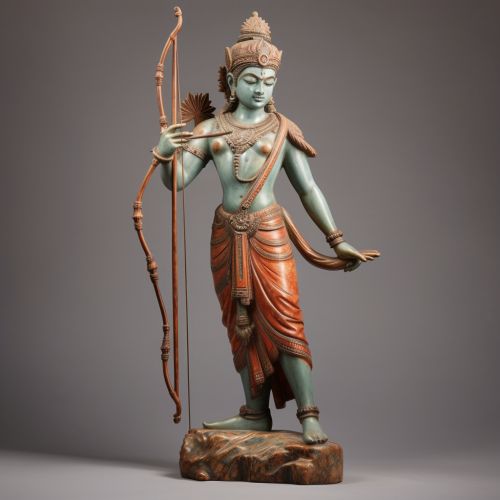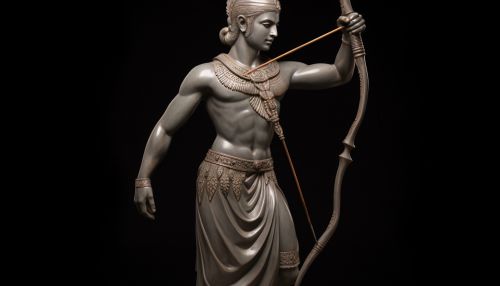Rama
Origins
Rama, also known as Ramachandra, is a major deity in Hinduism. He is the seventh avatar of the god Vishnu, and a king of Ayodhya in Hindu scriptures. Rama is also the protagonist of the Hindu epic Ramayana, which narrates his idealistic ideas and his adventures.
Etymology and Other Names
The name Rama appears repeatedly in Hindu texts, for many different scholars and kings in mythical stories. The word also appears in ancient Upanishads and Aranyakas layer of Vedic literature, as well as music and other post-Vedic literature, but with unrelated meanings. The Sanskrit word 'Rama' is derived from the root 'ram', which means "to stop, stand still, rest, rejoice, be pleased". In Vedic Sanskrit, the term also means "dark, dark-colored, black" and is a euphemistic term for death.
Literary Sources
The primary source of the life and journey of Rama is the epic Ramayana composed by Valmiki. The Vishnu Purana and the Bhagavata Purana also recount the story of Rama's life in the context of Vishnu's incarnations. Rama's life is also embedded in the Hindu texts of the Mahabharata and the Puranas, which provide additional details and variations.
Life and Legend
Rama is portrayed in Hindu arts and texts as a compassionate person who cares for all living beings, as well as an individual who is patient, self-controlled, virtuous and righteous. Rama's life and journey is one of adherence to dharma despite harsh tests of life and time.
Iconography
Rama's iconography varies. He is typically portrayed as a standing figure, with an arrow in his right hand, a bow in his left and a quiver on his back. Rama is shown in some images as a model king, or as a godly figure with two hands.
Worship and Festivals
Rama is revered for his unending compassion, courage and devotion to religious values and duty. He is the central figure of one of the major Hindu festivals - Ram Navami, which celebrates his birth. In some parts of India, Rama's return to Ayodhya and his coronation is celebrated as Diwali, which is a major Hindu festival.
Influence
Rama's life, particularly his adherence to dharma (righteousness), is held as an ideal for every individual. His life has been a frequent subject of artistic expression such as literature, sculpture, drama, and films in cultures across South and Southeast Asia.


